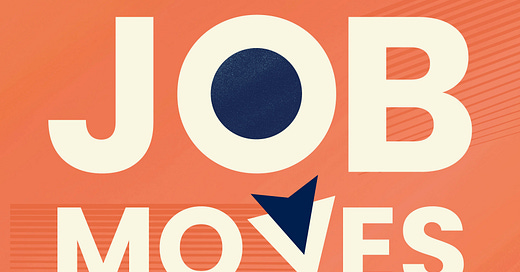As 2024 winds down, I first want to thank each of you for your support over this past year and engagement in creating a world in which all individuals can build their passions, fulfill their potential, and live a life of purpose.
I’m grateful that our new book, Job Moves: 9 Steps for Making Progress in Your Career, made USA Today’s best-selling book list two weeks in a row because of the positive impact it will have on so many individuals navigating their career and life pursuits.
I’m grateful that so many of you have reviewed the book here on Amazon. Your feedback helps others discover this resource as they seek progress in their careers.
If you haven’t yet bought a copy—for yourself or someone you know who is struggling in their career or exploring their next steps—I hope you’ll consider doing so here:
Media Highlights
To further whet your appetite, here are a few recent media appearances featuring insights from the book.
Yahoo! Finance’s Wealth!
I joined host Brad Smith on Yahoo! Finance’s show Wealth! to share three tips from the book for those looking to change jobs.
Slow down and figure out what progress looks like for you.
Learn how to tell your story.
Be clear about the trade-offs you’re willing to make to achieve your desired progress.
The Next Big Idea Club
My coauthor, Ethan Bernstein, and I shared five counterintuitive ideas from Job Moves for the
Club (make sure to subscribe to their Substack as well!):Stop focusing on the features of jobs. Instead, identify the root causes of why you want to change jobs.
Climbing the career ladder isn’t the same as making progress in your career. Instead, when you’re switching jobs, you should try to figure out what you actually want to do in your next job. That’s what will lead to true progress.
When you ask someone what they want to do next, people typically think they should start with one answer. But the reality is that job seekers should first build 3 to 5 prototypes for what they could do next.
Your resume isn’t going to effectively tell your career story for you, and it therefore isn’t going to convince anyone what you should do next. You need to do that—with a little help from Pixar.
Although our mental image of job searching these days is often someone sitting alone at a desk and submitting their resume to as many online job postings as possible, it turns out that successful job switching is a social process.
CNBC’s Make It
CNBC’s Make It interviewed me about the book. I shared how after over a decade of interviewing and studying more than 1,000 individuals who had changed jobs— from CEOs to Chipotle frontline employees— we distilled what made individuals happier with their job moves. The secret? Focus on progress over perfection in your career, which leads to greater fulfillment than chasing a mythical job that ticks all of your boxes.
BBC’s Business Matters
I joined BBC’s Business Matters this past Wednesday evening to talk about our research findings. Tune into our conversation here at the 45-minute mark.
Read to Lead Podcast
My coauthor Bob Moesta and I then had some fun together on Jeff Brown’s “Read to Lead” podcast. We talked about:
How analyzing past job transitions can illuminate patterns and provide valuable insights for present and future job searches
How to effectively leverage your existing network, including “weak ties,” to gain valuable insights into the realities of specific jobs and uncover hidden opportunities
Tips on navigating the often delicate balance between self-promotion and humility during interviews
How it’s critical to know—and sometimes name—what you “suck at”
Boston Business Journal
And finally, we were honored that Larry Gennari named Job Moves one of his top books of 2024 in the Boston Business Journal. Check out the rest of the list—and his reasons why.
Chips and Higher Ed: What the Federal Investment Means for Colleges
Jeff Selingo and I released our last episode of Future U. before the holiday break. In a fun, storytelling format, we dove into what the CHIPS and Science Act—the federal spending package designed to reduce the United States’ reliance on foreign manufacturers for microchips and other advanced technologies—means for a segment of American postsecondary institutions that’s often forgotten in these conversations: community colleges.
We spoke with nonprofit leaders about how the CHIPS Act supports the education and training of a high-tech workforce—and then take you inside our visit to the College of Western Idaho, a community college serving 30,000 students, to get a view into how they are developing these programs in collaboration with their corporate partner, Micron. It’s a 20-minute episode you don’t want to miss.
Thanks as always for reading, writing, and listening.





